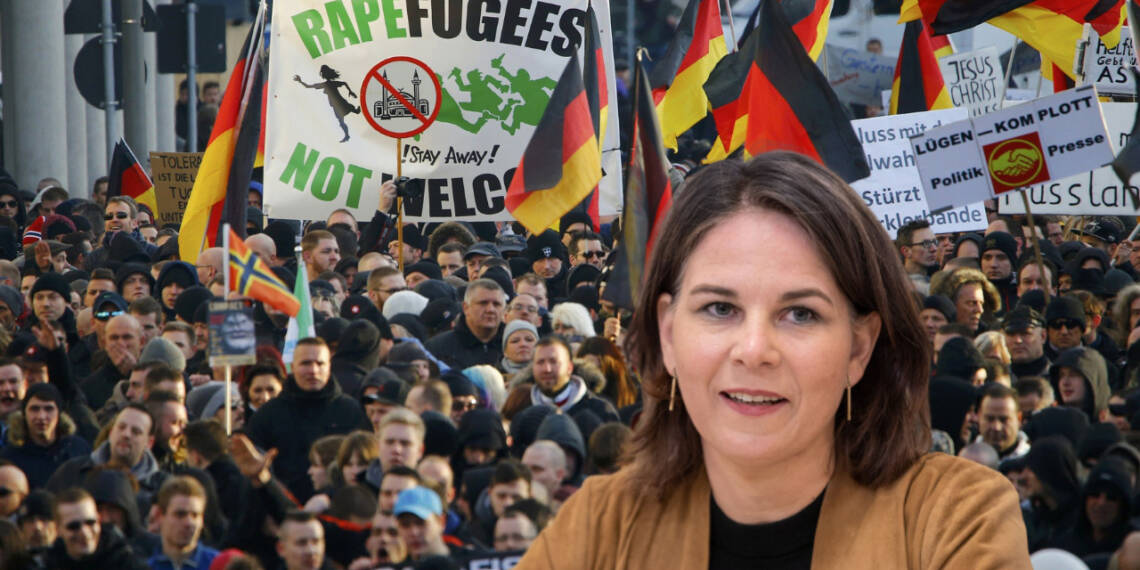The Greens Party in Germany has taken a critical stance against its coalition partners, marking a significant departure from their previous positions. The criticism primarily revolves around the handling of asylum seekers without valid reasons for staying in the country.
Ricarda Lang, co-chair of the Greens party, has publicly asserted that the government needs to take more decisive action to prevent further arrivals. This is indicative of a growing concern within the Green party regarding the management of this issue.
Former Greens Party president Joachim Gauck has also entered the discourse, emphasizing that the measures implemented thus far have been insufficient in addressing the apparent loss of control over the situation.
Gauck, a former Lutheran pastor, has advocated for the adoption of a “limitation strategy” to reduce the number of asylum seekers, even if it involves initially unpalatable measures.
The Migration Alarm: Greens Party Up in Arms
This sentiment has been echoed by German President Frank-Walter Steinmeier, who has warned that Germany is nearing a breaking point due to the influx of asylum seekers. With 162,000 asylum applications in the first half of the year, Germany now faces a significant challenge that requires addressing and potentially repatriating those who have no valid reasons to stay in the country.
In 2023 Germany faces a significant migrant crisis, with approximately 175,000 asylum requests excluding Ukrainians. Germany’s generosity has extended to over 1 million refugees from Ukraine, who undergo a unique asylum process due to Russia’s ongoing conflict.

Simultaneously, the German government has been actively trying to attract migrants to fill around 2 million job vacancies. Lawmakers took action in June to reform skilled work immigration laws to facilitate this process.
However, a challenge persists as many incoming migrants are not inclined to contribute to the country’s struggling economy. Instead, a considerable portion appears more interested in government subsidies intended for migrants.
Read More: If Scholz actually bans the AfD, Germany will implode
From Pro to Anti: Greens Party wakes up
Consequently, Germany has emerged as a significant destination for Ukrainian refugees, reminiscent of the 2015 migrant crisis, albeit with potentially graver implications. Additionally, Italy is exerting pressure on Germany to share the burden of incoming migrants as part of the Germany-France-Italy Migrant deal.
The recent shift in the stance of the Greens party in Germany regarding migrants is indeed surprising, given their historically liberal and pro-migrant orientation. The party has been known for its support of migrant-friendly policies.
In the 2017 federal elections, the Greens party proposed a plan to increase migration to Germany, including the introduction of a “Talent Card” scheme designed to attract more migrants. They also emphasized facilitating immigration through university programs, vocational training, and professional development initiatives, aiming to help asylum-seekers and those with restricted residency rights obtain work-related residence permits.

The party was particularly critical of bureaucratic hurdles in the immigration department, advocating for streamlined processes to expedite migration.
However, there has been a noticeable reversal in their position, as they now call for a crackdown on migration. This shift is a significant departure from their previous pro-migrant stance and underscores the evolving dynamics surrounding the migration issue in Germany.
Germany finds itself at a pivotal moment, with migration reshaping the nation amidst economic challenges and rising crime rates. This has fueled growing impatience among the German populace with the ruling political parties, particularly the SPD-FDP-Greens coalition.
Anti-immigration sentiment is on the rise, significantly impacting the political landscape. The Alternative for Germany (AfD) party has capitalized on this sentiment, garnering increasing support. AfD’s staunch anti-migrant stance has gained popularity in Germany.
The AfD’s ascent underscores the shifting political dynamics within the country, as the party channels the frustration and concerns of a segment of the population regarding immigration-related issues. This political landscape is emblematic of the broader challenges and debates facing Germany as it grapples with the consequences of migration and its impact on society, the economy, and politics.
Read More: The Germany of 2025- No NATO, No Liberals and No Scholz
In response to the mounting popularity of the AfD and the shifting political landscape, the Greens are mobilizing to defend their constituency in Germany against the rising influence of anti-immigration voices. Time is running thin as the federal elections of 2025 approach, will the Greens party’s sudden shift render results? Only time may answer.
Watch More:








